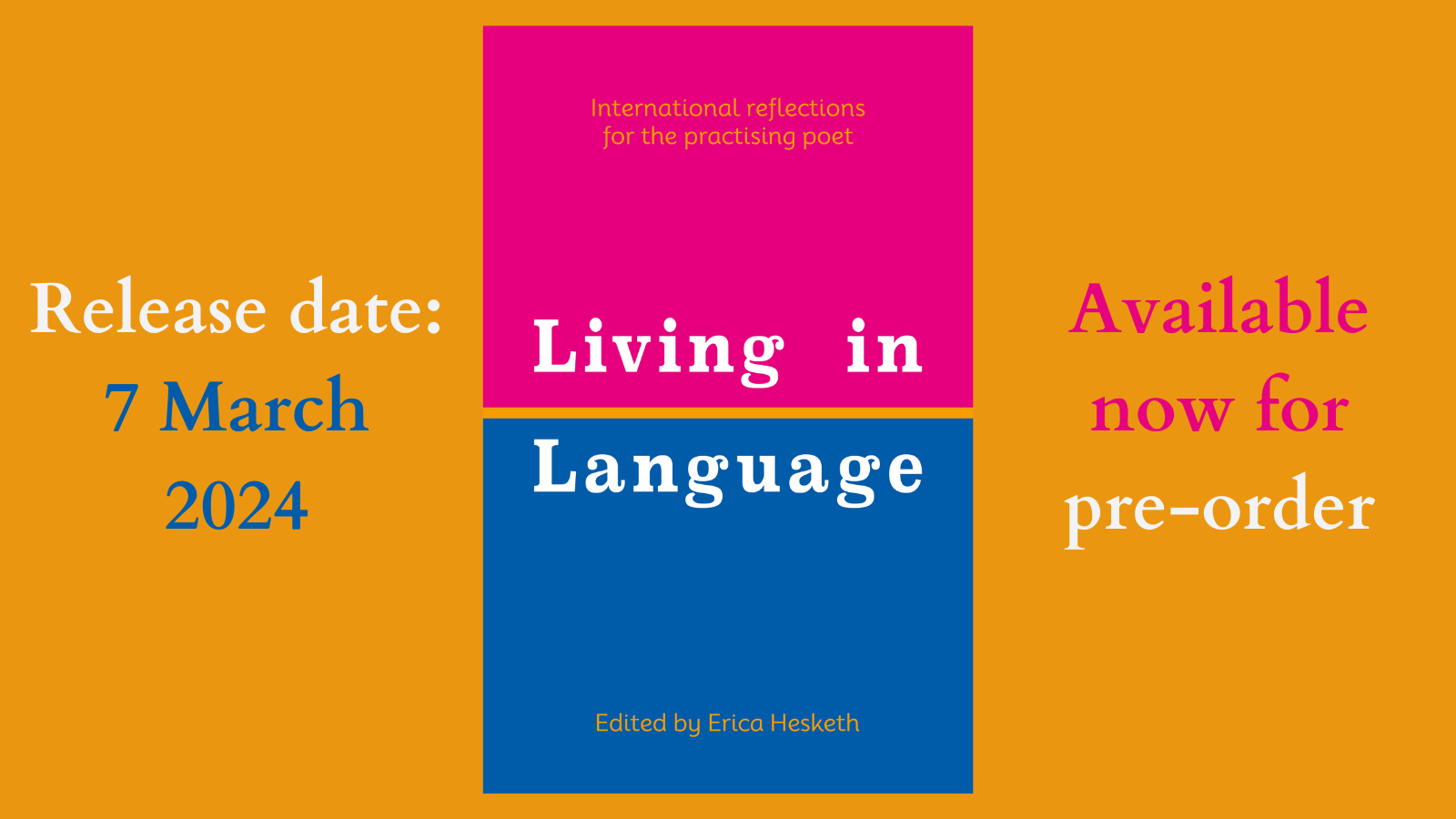Erica Hesketh reflects on the process of editing Living in Language: International reflections for the practising poet, taken from the foreward.
Living in Language brings together reflections on poetry by leading poets from Asia, Africa and Latin America who write in a language other than English. Within these pages you’ll find thoughts on the process of writing poems, from first inspirations to putting together a collection and beyond, by award-winning poets such as Bejan Matur (Turkey) and Al-Saddiq Al-Raddi (Sudan). You’ll find illuminating pieces on non-western poetic forms by Asha Lul Mohamud Yusuf (Somaliland) and Karan Kurose (Japan), as well as essays on identifying your voice and honing your words on the page by Mohan Rana (India) and Lee Hyemi (South Korea). And you’ll find plenty of newly translated poems to inspire you in your own practice.
However, this is not a how-to book; there are no writing prompts or tips on finding a publisher. Instead it is a book that turns towards questions of great importance: What is it to write about the female body, or from inside one (Legna Rodríguez Iglesias, Cuba)? What does it mean to be ‘in exile’ as a poet (Azita Ghahreman, Iran)? Who are your literary forebears, and are they different to mine (Gabriel Mwènè Okoundji, Republic of Congo)? What if your body isn’t safe in the world – what does that do to your poems (Zar Mose, Indonesia)? What is the rela tionship between poetry and the truth (Habib Tengour, Algeria)? What are your poetic obsessions (Yang Lian, China)? How does it feel to write in isolation (Carla Diacov, Brazil)? What is a poetic ‘journey’ (Karin Karakaşlı, Turkey)? Why do poets the world over reach for mythological archetypes (Diana Anphimiadi, Georgia)? What is ‘craft’ and how do you avoid showing it (Yu Yoyo, China)? Where is the space for male vulnerability in poetry (Weedhsame, Somaliland)? And what if everything about your art is political, from the subject matter to the language you choose to write in (Victor Terán, Mexico)?
This collection of remarkable pieces on the craft and purpose of poetry marks the 20th birthday of the Poetry Translation Centre. Since 2004, when it was founded by the poet Sarah Maguire (1957–2017), the PTC has championed poetry from Asia, Africa and Latin America through collaborative translation workshops, dual-language poetry collections and lively poet tours across the UK. We have been lucky enough to meet and work with poets who are megastars in their own countries; poets forced into exile because of their art or activism; older poets who have inspired multiple generations with their work; and younger poets at the vanguard of new poetic movements. It has been a privilege to reconnect with so many of them to put together this book.
Translating their poems over the years has, we believe, expanded what is possible in poetry in English, through the introduction of new poetic forms, ideas and styles – new ways of doing things. Our translation workshops have been a haven of mutual respect and creativity, as well as an energetic source of brand-new English translations; there are now over 600 translated poems available to read for free on the PTC website. And I wish you could bottle the feeling when a poem is read aloud at an event, in its original language and in translation – the moment when a poem from one place is held by a room full of people in another, when poetry itself becomes a shared space in which people from different backgrounds and perspectives can meet. I guess that magic bottle would be labelled ‘The opposite of war’, a phrase often used by Sarah to describe the act of translating poetry.
Of course, none of this would be possible without the many, many brilliant translators we have worked with since 2004, several of whom have translated pieces for this anthology. Translation is a creative act which is inherently political, and radical in both senses: it offers us a way to imagine entirely different worlds, and it reaches carefully down to the roots of a text to carry it, leafy and vibrant, to a new home in a new language. Translators are artists, stewards and advocates all rolled into one, and deserve much more recognition. In this book you’ll find a few reflections on the practice of translation itself, including thoughts on craft and graft by Argentine poet Laura Wittner, an exclusive excerpt from a work-in-progress by Brazilian poet Érica Zíngano, and an exchange of letters between Argentine poet Diana Bellessi and American writer Ursula K Le Guin, who became friends by translating each other’s poetry.
It should go without saying, but unfortunately can’t yet, that the readership or ‘market’ of poetry in this country is not a homogenous block of monolingual English-speakers; millions of us speak more than one language and have heritage from elsewhere. Since 2004 the PTC has worked to challenge the notions of ‘us’ and ‘them’ when it comes to poetry, and literature in general. The diverse poets we have championed may be ‘foreign’ to some audiences, but are very much ‘ours’ to the many well-established diaspora communities, and immigrants (like myself), who call this place home.
London, January 2024
Erica Hesketh is the Director of the Poetry Translation Centre.

